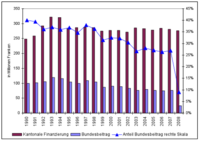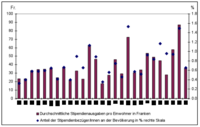

Although the Swiss federal government subsidizes the cantons’ scholarship expenditures with contributions, the cantons independently determine the conditions for awarding scholarships. This results in significant differences between the cantons.
Educational support
In Basel, student support through educational grants is older than the distribution of federal subsidies for students. The Basel Board of Education issued the first scholarship regulations in 1892. At the federal level, however, efforts to support students began only with the Scholarship Article approved in a December 1963 referendum.
Aside from the fact that education was traditionally considered a cantonal matter, the opinion of the conservative “minister of education” Philipp Etter was still influential in the late 1950s, who saw it as a matter of family pride to save money for a university education. In 1959, liberal federal president Max Petitpierre supported the transfer of the Department of the Interior responsible for federal higher education policy to the Social Democrat and Basel university professor Hans Peter Tschudi.
Educational support aimed to achieve two goals: economic promotion and the expansion of equal opportunities. Economic policy interests emerged in the context of Switzerland’s rapid phase of modernization and economic boom, and a paradigm of national-political competition driven by the notable lack of academically trained young professionals in the country. The cantons quickly adapted to the new subsidy opportunities, but the modalities of support remained quite disparate.
The Basel scholarship system was expanded in the 1960s for two reasons: to mitigate the shortage of academics and to enhance social equity (with a proposal to the City Council in 1965, and a law passed in 1967). This reform involved university members: Hans Gut, a professor of statistics, and Heinrich Popitz, a professor of sociology, along with three doctoral students who later held influential positions in related fields: Franz Hess, responsible for university matters in the Department of Education; Willi Schneider, secretary in the Department of Education; and Fritz Latscha, editor of the Basel National-Zeitung. Their joint report was titled: “Die Ungleichheit der Bildungschancen: Soziale Schranken im Zugang zur höheren Schule” (Inequality of educational opportunities: social barriers in access to higher education).
Recent developments
Since 1993, Swiss federal contributions to cantonal expenditures have significantly decreased. In 1993, they were 119 million Swiss francs. Thereafter, they stabilized at around 75 million per year, and then dropped to 25 million following the creation of the new federal law on 6 October 2006 (effective 1 January 2008) regarding contributions to cantonal expenditures for scholarships and student loans in the tertiary education sector under the New Financial Equalization (Neuer Finanzausgleich, or NFA).
In 1990, the federal government contributed 40 percent of cantonal education funding. The new law reduced this share by 2008 to only 9 percent of total expenses. The credit of 25 million Swiss francs was allocated to the cantons based on their population, resulting in a subsidy rate of 5 percent for Basel-City with a total of 0.6 million Swiss francs.
In 2008, the cantons awarded 276 million Swiss francs in scholarships and 27 million Swiss francs in loans to individuals in education beyond mandatory schooling (i.e., secondary level II and tertiary level). Adjusted for inflation, the total amount of cantonal scholarships has decreased by 25 percent in real terms since 1994, despite the continuously increasing number of students and learners.
Of the approximately 555,750 individuals who received postmandatory education in 2008, 49,400 received a scholarship, which corresponds to a funding rate of just under 9 percent. This is the lowest rate ever recorded within the modern scholarship system; in 1980, it was almost 16 percent.
The significant disparities between the cantons are also very clearly reflected in the cantonal scholarship or funding rates. That said, in 2008, Basel-City and Basel-Countryside were at the top of the cantonal spending comparison with 18 percent (Basel-City) and 13 percent (Basel-Countryside).
The Intercantonal Agreement on the Harmonization of Educational Contributions
Joining the Intercantonal Agreement on the Harmonization of Educational Contributions obliged the canton to comply with certain principles and minimum standards in assessing educational contributions. Cantonal scholarships were expected to align with these principles and standards after a five-year transition period from the agreement’s entry into force.
This allowed for harmonization in crucial areas while enabling each canton to account for regional particularities. The agreement aims to ensure formal harmonization of the scholarship system and to advance material harmonization. Material harmonization, i.e., the alignment of different scholarship benefits, can only be achieved in the long term based on a shared foundation of calculations, given the twenty-six different scholarship laws and twenty-six different cantonal tax laws. Therefore, Article 20 of the agreement stipulates that the conference of the cantons joining the compact shall issue recommendations for the calculation of educational contributions.
With a unanimous decision by the Grand Council on 17 March 2010, Basel-City became the first canton to join the scholarship compact. This reflects Basel’s pioneering role in the Intercantonal Scholarship Conference (IKSK) in establishing the agreement. The Basel parliament thus presented a wonderful gift to the university for its 550th anniversary, but more importantly, to the educational and research sectors in Basel and Switzerland.


